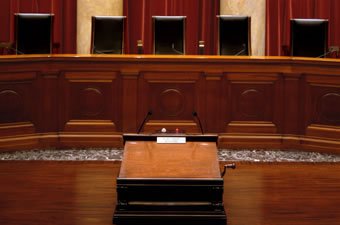
2009 SUPREME COURT’S DECISIONS’ IMPACT IN CRIMINAL LAW
 In the Supreme Court’s most recent term, several cases involving criminal law were addressed and the Court issued several decisions that could have a significant impact upon the constitution rights of criminal defendants under Colorado criminal law.
In the Supreme Court’s most recent term, several cases involving criminal law were addressed and the Court issued several decisions that could have a significant impact upon the constitution rights of criminal defendants under Colorado criminal law.
In Melendez-Diaz v. Massachusetts, 129 S.Ct. 2527 (2009), a drug case out of Massachusetts, the Court addressed the issue in distribution of cocaine case of whether the prosecution could prove results of forensic testing showing the presence of cocaine through “certificates of analysis” notarized by the analysts at the Department of Public Health. Over the Defendant’s objection to the evidence on the grounds that admission of the certificates would deny his constitutional right to confrontation of a witness as that right has been expounded by the Court in its seminal case of Crawford v. Washington, 541 U.S. 36, 124 S.Ct. 1354 (2004), the trial court admitted the certificates of analysis. In a 5 to 4 decision, the United States Supreme Court reversed the Defendant’s conviction.
The Court held that under its analysis in Crawford, which was a domestic violence case murder case but had applicability to this drug case, the “Certificates” or affidavits were testimonial statements and that as a consequence the Defendant had the right to confront at trial the analyst making the statement that the substance seized was cocaine.
Colorado criminal law has a statute similar to the statute ruled unconstitutional in Melendez-Diaz. This Colorado statute is used routinely by Colorado prosecutors to avoid the requirement of producing the live testimony of forensic analysts in many types of cases including drug or controlled substance violations, Driving Under the Influence of Alcohol or Drugs (DUI), Crimes of Violence, and any offense when the state relies upon forensic analysis to prove their case, including domestic violence or assault cases. It is imperative that Defendants object to the introduction of such evidence through the use of affidavits or certificates in order to protect their Constitutional Right to Confrontation of a witness. The failure to contest this type of evidence during a criminal trial could mean the difference between acquittal and conviction. The attorneys at Seawell and Buckmelter, PC, the Denver Criminal Defense Attorneys, are well versed in the impact of the Melendez-Diaz decision and will use that decision to protect its clients’ Confrontation rights.
Another significant decision was issued by the Supreme Court in Herring v. United States, 129 S.Ct. 695 (2009). In Herring, the Court addressed the issue of whether evidence seized in that case (drugs and a handgun) by the police from an individual incident to his arrest on an erroneously issued warrant could be used against him at trial. The court reasoned that it could be used even though the search and arrest were “unreasonable.” The Defendant was arrested on a warrant that had been recalled some five months earlier. However, due to a “bookkeeping” error, the warrant erroneously showed that it was “active.”
The Court reasoned that the error at issue was due to an isolated incident of “bookkeeping negligence” and that to justify exclusion of the evidence police conduct must be sufficiently deliberate that exclusion can meaningfully deter it, and sufficiently culpable that such deterrence is worth the price paid by the justice system [in letting guilty individuals go free].
Herring has significant implications in criminal defense cases of many different types – be it domestic violence cases, assault cases or drug cases. It is becoming more common for police to make stops, contact and arrest individuals on the basis of the existence of warrants on computerized databases or systems. My office has noticed that many traffic stops are routinely being justified on the basis of an automated license plate reader determining that the registered owner of the vehicle has a revoked or suspended license or revealing the existence of an active warrant for vehicle owner’s arrest. It is also the experience of this office that these computerized records are routinely inaccurate or outdated. If a search is conducted based on the erroneous warrant and drugs or evidence of any other crime is found, invariably, prosecutors will attempt to rely on the Supreme Court’s reasoning in Herring argue that their cases based upon unlawful searches and seizures should not be thrown out as such errors were simply “isolated bookkeeping errors.” In such instances, it is imperative that the accused be able to show that such errors are not isolated, but happen routinely and that the courts must exclude the illegally seized evidence to deter such shoddy police work in the future.
Finally in Arizona v. Gant, 129 S.Ct. 1710 (2009), a controlled substance case out of Arizona, the United States Supreme Court made a very significant decision which greatly limits the scope of the police’s authority to search vehicles incident to the arrest of an occupant of the vehicle. Prior to Gant, police had authority incident to the arrest of an occupant of a motor vehicle to search the passenger compartment of the vehicle (See, New York v. Belton, 453 U.S. 454 (1981). The authority to search the passenger compartment extended to closed containers within the vehicle within the reach of the person arrested. The court noted that in the last nearly 30 years since Belton was decided “countless individuals guilty of nothing more serious than a traffic violation has had their constitutional right to the security of their private effects violated as a result . . .” The court then limited such blanket authority to search a vehicle incident to arrest by holding that the police may search a vehicle incident to an occupant’s arrest only if [1] the arrestee is within reaching distance of the passenger compartment at the time of the search or [2] it is reasonable to believe the vehicle contains evidence of the offense of arrest.
Police are routinely trained that they may engage in seemingly limitless searches of vehicles and closed containers within them anytime they arrest an occupant of the vehicle. There is every reason to believe that police will continue to engage in such limitless searches despite the Supreme Court’s ruling in Gant. It is therefore incumbent upon individuals charged with drug offenses or any other offenses stemming from searches of their vehicles and contents incident to arrest to challenge such searches based on the new limits placed on police by the Supreme Court in Gant.
